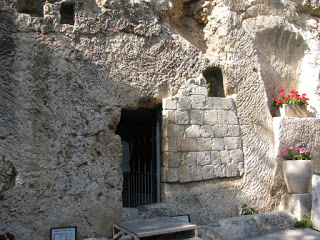[vc_row][vc_column width=”1/1″][/vc_column][/vc_row][vc_row][vc_column width=”1/1″][vc_column_text]I took some time Saturday to unplug and enjoy the silence. In the quiet, I listened to the birds, watched fish jump, and pondered the events of the first-century Passover weekend and the implications of the empty tomb. One truth came to mind and echoed in my heart all day long:
No one was neutral about Jesus.
The disciples loved Him. The Pharisees hated him. The Romans feared him. Each group had a different response to Jesus, His crucifixion, and His empty tomb.
The advance cover-up
I don’t know what the disciples anticipated after Jesus’ crucifixion, but the chief priests and Pharisees remembered His words, “Three days and I will rise again.” They expected something to happen.
The day after Jesus’ death and entombment, they met with Pilate, expressed their concern, and asked him to secure the tomb lest Jesus’ disciples attempt to steal His body and fake His resurrection. For once, Jewish leaders and Roman authorities worked in concert. Pilate gave them a guard and orders to place a royal seal on the tomb. (Matthew 27:62-66)
Surprised by an angel
The Roman guards stayed at the tomb night and day as they waited for grave robbers. Instead, the guards encountered something they never expected. The ground shook, tomb opened and an angel, dressed in shimmering white, took up the vigil. Jesus’ was gone, just as the Pharisees feared, but His body wasn’t stolen away. He was alive.
Hopes and fears realized
We seldom talk of this in church, but the women who went to the grave early that Sunday morning were not the first ones to experience the miracle of the empty tomb. The soldiers were, yet there was no joy in it for them.
The missing Jesus meant danger and certain punishment from their superiors. Their response was to look for a way to save themselves, and they turned to an unlikely agent for help – the chief priest.
When the women arrived at the tomb, they found an unexpected sight. The women anticipated anointing Jesus’ body with the aromatic spices they carried, but there was no corpse to prepare. The stone stood to the side of a gaping black hole, the tomb empty, His body gone.
Pharisaical self-preservation
The Roman guards reported exactly what happened. The rolled stone. Empty tomb. Guarding angel. Missing corpse. They reported the truth, and the Pharisees quickly saw the implications of a resurrected Jesus. If Jesus was who He said He was, their role in religious life was over. They rejected truth without a moment’s hesitation.
As an act of self-preservation, they paid the guards to lie, then spread the agreed-upon lie throughout the city. (Matthew 28:11-15) They didn’t count on the power of a walking and talking Jesus to prove them wrong.
Why Jesus’ resurrection mattered
To the disciples, Jesus’ resurrection demonstrated His power and deity. It proved the truth of His words. Their doubts and fear vanished. There was no more hiding or denials. Henceforth, they not only proclaimed His resurrection, but willingly suffered persecution, imprisonment, and death for the cause of Christ.
For the Pharisees, Jesus’ resurrection also demonstrated His power and deity. It suggested His claims of Messiah were true, but He was not the governmental authority they desired. The Jesus who overturned the tables of moneychangers in the temple was more likely to overthrow the religious rulers than the political ones. A risen Jesus threatened their authority, power, and way of life.
To the Romans, a new Messiah meant a Jewish king, one who posed a very real threat to Rome’s power in the region. Pilate, as the reigning representative of Rome, kept his position and power by maintaining the fragile peace. He refused to risk or relinquish his authority to the Jewish upstart king.
The amazing truth about all three groups is that no one doubted Jesus’ had risen from the grave. The Roman soldiers knew from experience He had risen. The Pharisees clearly believed the testimony of the soldiers. The disciples, of course, embraced it.
Jesus’ resurrection demanded a response. Accept Him or reject Him. Neutral wasn’t an option.
The response to the empty tomb
Three groups of people recognized the significance of a risen Savior and knew it would change everything. The Roman guards and the Jewish elders chose to reject the change a risen Jesus demanded. They kept earthly power but missed the divine encounter.
The disciples embraced the divine and abandoned their hopes of earthly power. All doubts and fear vanished, and they set their sights on heaven. The resurrected Jesus remained their focus for the rest of their lives. They endured persecution, torture, and death because of their commitment to Him. The empty tomb changed everything and they were never the same again.
The if-then response
The ever-controversial empty tomb still demands a response. Jesus’ resurrection declares His sovereign right to rule in us. If we believe the truth of the empty tomb, then we must allow it to inform the rest of our lives. We either let it shape us into the loving and compassionate disciples Jesus intended or reject its truth and embrace the world. We cannot have it both ways.
If we believe, we must obey.
It’s that simple. It’s that hard. Jesus summed up the law in two commands. Love God with all our being, and love our neighbor as we love ourselves. Who is our neighbor? Everyone. The love Jesus offered was both extravagant and unlimited love. It’s the kind of love we must offer, too.
Celebration yesterday demands victory today.
If we celebrated a risen Savior yesterday, we must live in the light of His victory over sin and death today. Like the disciples, we must allow it to inform and transform every area of our lives. There is no excuse to live as the world lives.
We have a Savior who defeated sin and death.
He has already fought every enemy, won every battle, declared victory over every area of our lives. There will never be another day in which we should cower in fear, cringe in defeat, or shy away from persecution and death.
The tomb was empty and our King is alive, so this day, we love. This day, we serve. This day, we go forth in power.
Because He lives, we must do likewise.
_______
You might also enjoy reading:
What Happened to the Power of Our Faith, 21st Century Church?
Worship at the Judas Rock: When We Identify with the Betrayer
This sermon from Pastor Scooter Noland might be helpful, as well: “How Can We Know?” (part 5 of a sermon series, Unspeakable: Things We Don’t Talk About in Church”) (sermon isn’t posted at 6 am but should be up later today)[/vc_column_text][/vc_column][/vc_row][vc_row][vc_column width=”1/3″][vc_column_text]Here’s a pinnable image for Pinterest:
Thanks for pinning![/vc_column_text][/vc_column][vc_column column_width_percent=”75″ position_horizontal=”left” overlay_alpha=”50″ gutter_size=”3″ medium_width=”0″ mobile_width=”0″ shift_x=”0″ shift_y=”0″ shift_y_down=”0″ z_index=”0″ width=”1/3″][vc_single_image media=”66664″ media_width_percent=”75″ border=”yes” media_link=”url:https%3A%2F%2Fwww.leannahollis.com%2Fcelebrate-empty-tomb-transform-lives%2F||target:%20_blank|”][/vc_column][vc_column width=”1/3″][/vc_column][/vc_row]

